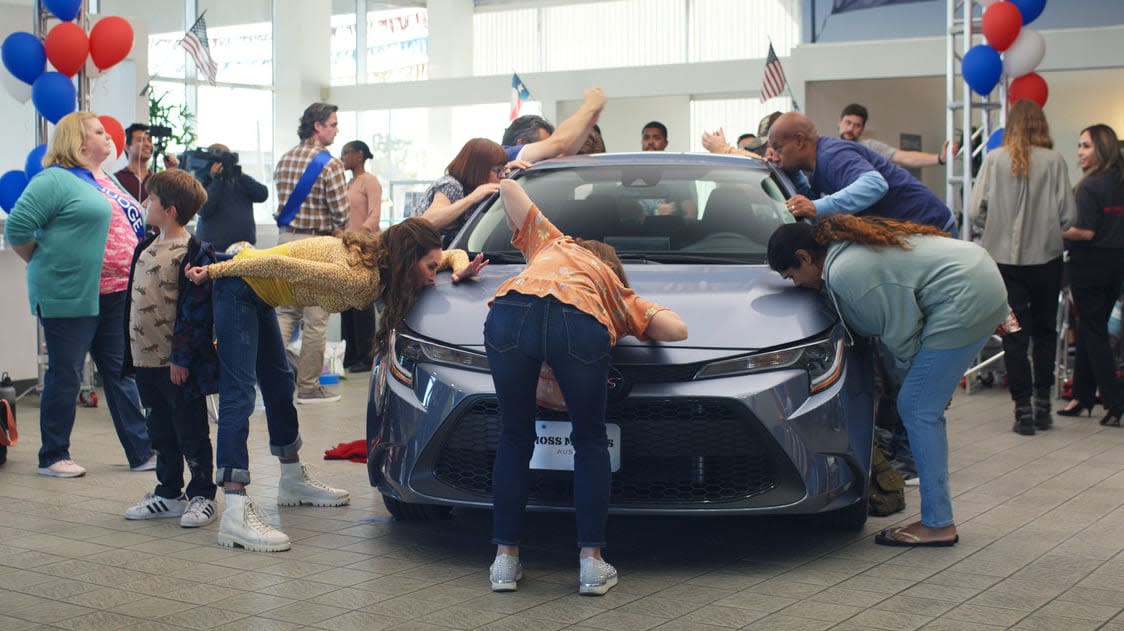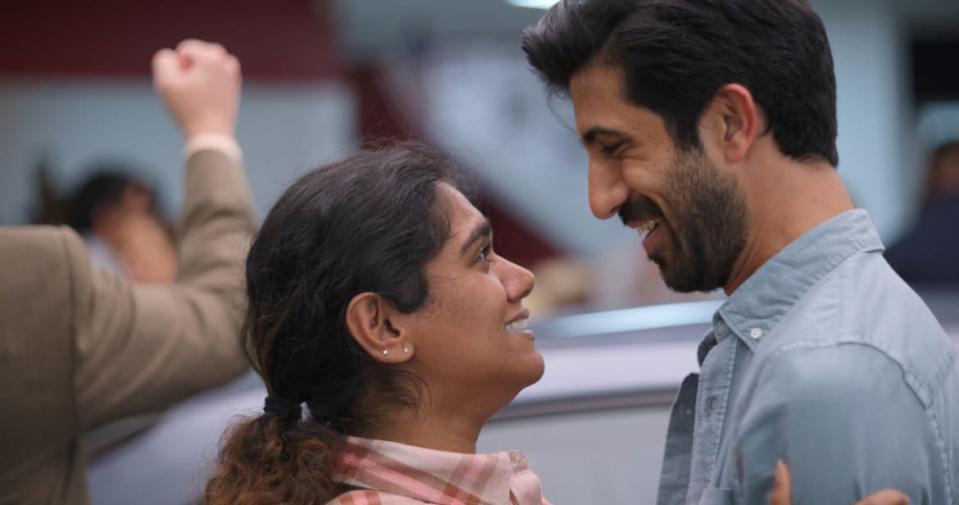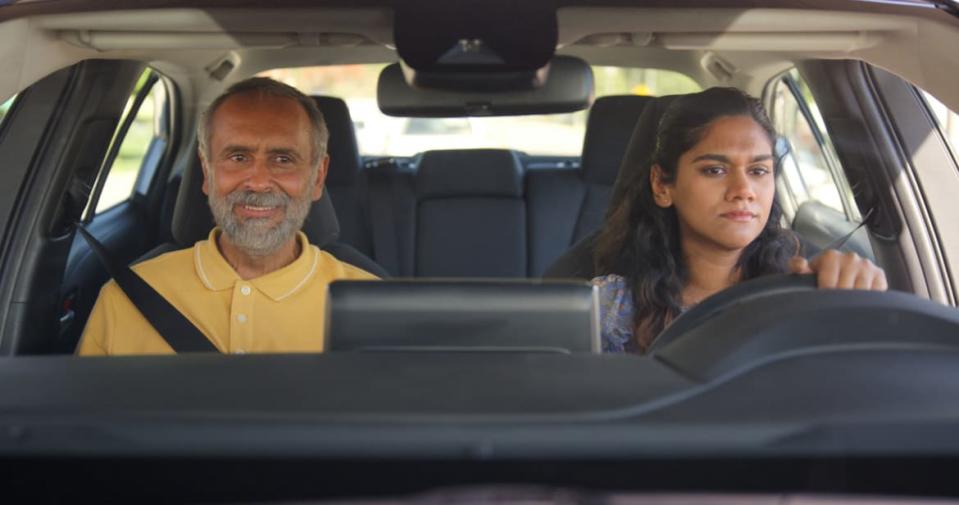‘Little America’ Turns a Car-Kissing Contest Into the Year’s Most Heartwarming TV

- Oops!Something went wrong.Please try again later.
- Oops!Something went wrong.Please try again later.
- Oops!Something went wrong.Please try again later.
Television is constantly getting bigger. With approximately 752,000 new ones released every week and new streamers constantly vying for your attention, TV shows are starting to feel more like big cinematic productions. The time where A-list Hollywood stars appeared in television was a big surprise is long gone; such things now feel commonplace. With the scale of productions on a steady incline— with shows like Rings of Power and House of the Dragon having eye-watering budgets—it feels like the days of small-scale, intimate storytelling are behind us. Thankfully, Little America is back with its brilliant second season, to remind us that there’s still a place for small, impactful stories.
The Apple TV+ series, created by Lee Eisenberg, Emily V. Gordon, and Kumail Nanjiani, is a heartwarming anthology that follows the stories of people all linked by one thing—they are immigrants living in America. Other than that, the stories are entirely different, with some spanning decades and others a single day. They’re all based on true stories too, adapted from Epic Magazine’s series of the same name.
What the show does best is subverting the norm when it comes to stories about life as an immigrant. The common mainstream immigration story is tinged with tragedy, and they can feel like miserable slogs, as we see people enduring unimaginable cruelty. Little America is a delicious tonic to those troubling images, offering tender, optimistic slice-of-life stories about immigrant experiences. It celebrates all things multiculturalism, and lord knows that is desperately needed in a time where the loudest (and most obnoxious voices) seek to divide us. Just as Season 1 was in 2020 (!), Season 2 has arrived as the year’s most optimistic show.
‘Little America’ Is Apple TV+’s First Great Show, and a Beautiful Love Letter to Immigrants
That said, it’s not just lollipops and rainbows, as Little America understands the monumental challenges faced by immigrant families. It’s particularly keen on showing the balance actin first-generation immigrants must maintain, between making necessary sacrifices and satisfying the desires of their children, which may or may not align with those of their parents.
The most beautiful distillation of that idea is found in Season 2’s best episode. The great thing about anthology series like this one is that you can watch any episode you like without missing any crucial plot points from a previous episode. While I wholeheartedly recommend you dive into the whole series, if you just want to sample Little America, watch this episode: “The 9th Caller.”
The episode, written by Gordon and Najiani, and directed by Tinge Krishnan, follows Sachini (Isuri Wijesundara), a Sri Lankan American, who’s the lucky ninth caller in a radio contest. Sachini is ecstatic to have won this giveaway, a car, so easily. What luck! Of course, that would be too simple. When Sachini arrives at the car dealership to claim her prize, she’s discovered that she’s one of many ninth callers, and to win the car, she’s got to enter a kiss-a-car contest, which is… well, it’s exactly what it sounds like. Sachini, along with the other competitors, has to keep her lips on the car until only one person remains. Every hour, they’re blessed with a 10-minute break, the end of which is signaled by the song “Kiss Me” by Sixpence None The Richer.

As Sachini throws herself into the contest, the episode cleverly uses flashbacks to tell us about her life. Her father Hashan (Bernard White), a celebrated engineer in Sri Lanka, decided to move their family to America when Sachini was a kid. We see her father talk to her before they’re about to leave for Texas—a conversation shot in the warm, nostalgic glow of the Sri Lankan sun—as he tells Sachini that he’s giving up the family, friends, and job that he loves so that he can give her a better life. “I’m doing it for you… You’ll mop the floor with American students. Your being a success is everything to me,” he tells her. That’s a lot of pressure for anyone to be under, let alone a child. But it’s a familiar feeling for a lot of second-generation immigrants, whose parents gave up everything they knew for a chance at prosperity for their children.
But a previous scene in the episode reveals to us the repercussions of that upheaval. Sachini and her father have an awkward phone call that’s laced with disappointment from Hashan and considerable shame from Sachini. It’s clear that this sacrifice Hashan made for his family hasn’t paid off in the way anyone would like. After all, Sachini probably wouldn’t be participating in a contest that’s been known to take well over 24 hours (my mouth aches just thinking about it) if she was thriving with the job her parents dreamed that she’d have.

Another crushing flashback shows the harsh reality of the immigrant experience in America. A disheveled Hashan returns home from a long day. The cinematography is much different than it was for the scene in Sri Lanka—that warm glow has become a cold blue that’s more reminiscent of a funeral parlor than a family home. Hashan’s impressive credentials apparently mean nothing stateside, and he can’t find employment, eventually settling on a janitorial position at his daughter’s school. Even worse, Sachini is struggling in classes, failing to live up to her potential—or, perhaps more accurately, the potential her father has decided she possesses.
In the present day, Sachini clearly still feels stifled by the weight of her family’s expectations. During one of the breaks, her lack of ambition is mocked by the contest host Wayne the Brain (an impressively obnoxious Kyle S. More). Sachini tells the Brain that she’s just hoping to land somewhere in the middle of the pack. It’s a telling moment that tells us everything about who Sachini is: a millennial first-gen woman trapped by parental expectations, stuck with no particular direction to go in. In talking with a fellow competitor, Sachini lays it bare about her father: “He gave up the thing he loves the most so his daughter could be unemployed and make out with cars.”
“The 9th Caller” works so perfectly because Sachini’s story is not only distinctly individual, it’s also universal. I found myself relating deeply to the so-called millennial malaise that she experiences. She struggles in the face of a challenge, walking out of an exam at university because the pressure is too high, ultimately dropping out altogether. That leads to a heartbreaking scene, where Hashan discovers Sachini working at a buffet, unaware that she dropped out of school.
The inequality of our society is so apparent to Sachini, someone who’s watched their once-thriving father become a janitor because his accomplishments have less merit in America for reasons that absolutely nobody can properly quantify. (There’s nothing wrong with being a janitor, of course, but the man was a chemical engineer in Sri Lanka). In a world where, for the first time ever, the next generation might be worse off than the one before it, it’s hard to feel like it’s worth doing anything at all.
Which is why it’s so exciting to watch Sachini throw herself into winning that car. The scenes of the car-kissing contest (not a phrase I ever thought I’d write, but alas) are thrilling, as Krishnan films it like a high-level sports event, with extreme close-ups maximizing the intensity in what’s ultimately a fairly ridiculous situation. The tension remains impressively high as time updates appear on screen in large white text, and the contest goes for a ridiculous 50 hours.
Late into the competition, Sachini starts to hallucinate that her father is watching her compete, with a concerned look in his eyes. He doesn’t think she can do it, and why would he? She’s disappointed him every step of the way. Her imagination and reality are not the same, however. Sachini receives a video message from her mother, telling her that Hashan has organized a viewing party, even going to Best Buy to connect the computer to the TV with an HDMI cable so they can watch the livestream on television.
Sachini then finds the contest has gained traction on Facebook, which leads to a huge discovery: Her father has created a Facebook page for her, in which he regularly posts photos of his daughter and talks about how much he loves her. Even though she may not live up to his expectations, Hashan will always be proud of his daughter. This information, teamed with the fact that her family is actively rooting for her, gives Sachini the fuel she needs to get back in the game and win that car.
Just because Sachini’s life has been one disappointment after another, it doesn’t mean there isn’t something remarkable inside of her. The car contest provides an unexpected but surprisingly fitting place to channel a lifetime of frustration. She utilizes the grit and determination that comes from the immigrant experience to do what nobody expects her to do, not even herself—and that’s winning the whole damn thing. “The 9th Caller” reminds us that you can never count a person out, and that the most unlikely people are capable of incredible things.
But before she walks away with the prize, Little America surprises with a musical number, where Hashan lip-syncs to (what else?) “Kiss Me.” Flanked by Bollywood-style dancers and the other competitors, it’s a sweet, highly emotional moment. It reminds us that no matter what sacrifices we make in life, family (whatever that means to you) will always be there to pick us up and help us keep on fighting. As far as hallucinated musical numbers go, this may be the most beautiful I’ve ever seen.
I never expected to cry my eyes out over somebody winning a contest (for a car of all things—I can’t even drive!), but Little America had other plans. That is the beauty of great storytelling, after all: finding emotion in unexpected places? There’s no story too small to blow you away, and that’s something that Little America understands better than just about anyone else.
Get the Daily Beast's biggest scoops and scandals delivered right to your inbox. Sign up now.
Stay informed and gain unlimited access to the Daily Beast's unmatched reporting. Subscribe now.

